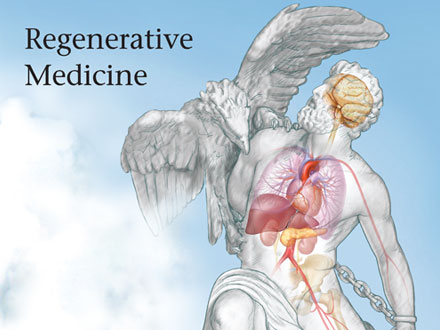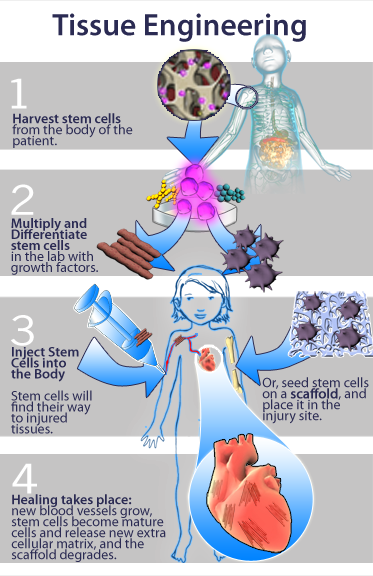Regeneration For Health
However, internationally, stem cell technology
is breaking ground in this relatively new field of regenerative medicine - and
it's not just for aesthetic or anti-aging motivations either.
One such medical technology company is
Cytori Therapeutics. CEO, Christopher Calhoun, who was in South Africa the end of
last year to launch the South African arm of the company, explains that it is his
company's aim to "revolutionize healthcare by leading the way into an era of
regenerative medicine, in which damage from cancer, heart disease and a host of
other ailments can be healed through your body's own cells." Calhoun
explains that his company has developed products that allow the doctor to take a
small amount of fat, the same volumes as about half a can of Coke, and separate
out the healing cells in about one hour. The cells are created by the patient
themselves, as fat tissue you carry around is the richest source of stem and regenerative
cells in the body.

The controversy surrounding stem cell research
has been, traditionally, that people typically relate this to mean embryonic stem
cells. Yet, adds Calhoun, the clinical work done worldwide is based on adult
stem cells that we all have in our bodies. "We have them because they are involved
in the continual cycle of tissue replacement and repair. It is these repair cells
that are the most practical and accessible."
And while stem cell grafting has been used
in aesthetic and anti-aging procedures, what Calhoun is most proud of, is his
company's work in the fields of breast and heart regeneration.
In 2011, approximately 230 000 women
were diagnosed with breast cancer in the United States; while in Europe on average
450 000 women are diagnosed with breast cancer on a yearly basis. Here in South
Africa, the lifetime risk is one in 29. Often breast conserving treatment (BCT)
is the treatment of choice for around 70% to 80% of cases, as it is considered
the least disfiguring option. Unfortunately, many patients seem to experience breast
asymmetry after BCT. However, the cell-enriched fat grafting helps
"rebuild" the breast using your own fat tissue in combination with the
regenerative cells that naturally occur in your body fat. Liposuction removes
excess body fat from either the stomach or thigh. The fat is divided into two
portions: one portion is used to extract the regenerative cells within the tissue
using the Cytori Celution 800/CRS medical technology. The other portion is
washed to remove impurities. The cells are then combined with clean fat and
re-grafted in micro droplets into the patient's breast to help restore its
natural look and feel.

Studies from the European breast reconstruction
trials, reported 85% physician satisfaction and 74% patient satisfaction after a
12-month period, and the technology has received the European approval (CE
mark).
Professor Frank Graewe, head of
plastic and reconstructive surgery at Stellenbosch University and Tygerberg
Hospital, showcased the US-developed ground-breaking surgery in Cape Town last
year and said that it was a significant improvement on similar methods currently
being used. While still relatively new in South Africa, it has been used successfully
in more than 4 000 patients in Europe and Asia. However, as it is priced at around
R85 000 for the breast reconstruction, it would only be used in specific cases
in the public sector, but would be available to private sector patients. Graewe
shares that stem cells have also been widely used in South Africa to treat leukaemia,
and the hope is that once further research on stem cell grafting is completed, this
could help play a vital role in helping to treat cancer.
“Stem
cells have also been widely used in South Africa to treat leukaemia”
More recently, Cytori has been working
on using stem cell grafting on those who have suffered heart attacks. Again, heart
disease is considered one of the leading risks of disease burden globally. According
to the American Heart Association 2012 update, on average 795 000 Americans experience
new, or recurrent heart attacks. Approximately 610 000 of these are first
attacks, with 185 000 recurrent attacks. On average, every 40 seconds someone
in the United States has a heart attack, and this accounts for one out of every
18 deaths in the States. And according to the World Heart Federation, around
25% of South Africa's healthcare spending is devoted to cardiovascular disease.
Cytori was recently been granted
permission by the FDA to initiate a 12-month clinical trial, following on from the
success of their European trial. In the previous trials, fat tissue was taken from
the abdomen of those patients who had recently suffered a heart attack; the stem
and regenerative cells were separated from the fat tissue and infused back into
the coronary artery of the patient. The patients were all treated less than 24
hours after they underwent a procedure intended to increase the blood flow
through the damaged artery. According to Tom Baker, the Director of Investor
Relations, those patients who received the stem cell injection in addition to
standard treatments had less heart damage and better blood flow through the heart
tissue than patients who were given standard treatments and a placebo. The stem
cell patients have also had a better improvement of heart health over the 18-month
period.
As Calhoun explains, published literature
reveals that this should dramatically help reduce the rate of patients
progressing to heart failure, recurring heart attacks, or even death.
Johan Kachelhoffer, of Divine Proportions,
who are the local distributors of Cytori products, adds that they hope to be bringing
the cardiac stem cell technology' to South .Africa by the end of the year.
And, says Calhoun, this is just the
start of what stem cells and regenerative medical technology can achieve.
Pillay concurs: "I firmly believe that potential uses of stem cell technology
are limited only by the boundaries created within our own minds. We are fortunate
to be living in an era where we now possess the knowledge and tools to solve a number
of great medical conundrums."